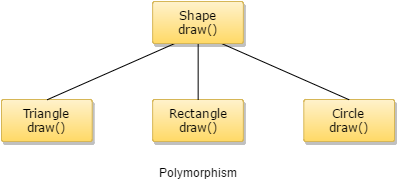The term Polymorphism is derived from the Greek word poly + morphos, where poly means many and morphos means forms. This tutorial describes Polymorphism in C++.
What is Polymorphism in C++
Polymorphism is another concept of object-oriented programming (OOPs). The attitude which lies beneath this concept is a "single interface having multiple implementations." This provides a single interface for controlling access to a general class of actions. Polymorphism can be gained in both ways:
- compile time and
- runtime
A common and simple example of Polymorphism is when you use >> and << as operator overloading in C++ for cin and cout statements, respectively. This bitwise shift operator at that time acts as an inclusion operator, and its overloaded meaning is defined in the iostream header file.

- Static Polymorphism
- Dynamic Polymorphism.
Static Polymorphism
In static Polymorphism or early binding, there you will get two subcategories:
- Function overloading is the process of using the same name for two or more functions.
- Operator overloading is the process of using the same operator for two or more operands.
Code Snippet for Function Overloading
Example:
class funcOl {
public:
funcOl ();
funcOl (int i);
int add(int a, int b);
int add(float a, float b);
};Code Snippet for Operator Overloading
Example:
class calc {
public:
// + operator overloading technique
int operator+(calc g);
private:
int k;
};It is to be noted that function overloading can be done and is possible only based on:
- The return type of that overloaded function.
- The type of parameters and their arrangement.
- Based on the number of parameters.
Dynamic Polymorphism
Dynamic Polymorphism refers to the entity which changes its form depending on circumstances at runtime. This concept can be adopted as analogous to a chameleon changing its color at the sight of an approaching object.
What Is Virtual Function?
A virtual function can be defined as the member function within a base class, which you expect to redefine in derived classes. To create a virtual function, you must precede your function's declaration within the base class with a virtual keyword.
Example of Using a Virtual Function
Example:
#include <iostream>
using namespace std;
class Game
{
int g;
public:
Game()
{
g = 1;
};
virtual void show()
{
cout <<g;
};
};
class Anim: public Game
{
int k;
public:
Anim()
{
k = 2;
};
virtual void show()
{
cout <<k;
};
};
int main() {
Game *g; Anim a; g = &a; g->show();
return 0;
}